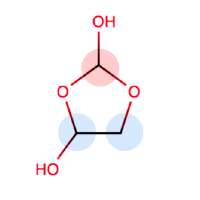#!/usr/bin/env python
"""
Wrapper classes for providing a minimal consistent interface to cheminformatics toolkits
Currently supported toolkits:
* The `OpenEye Toolkit <https://docs.eyesopen.com/toolkits/python/quickstart-python/index.html>`_
* The `RDKit <http://www.rdkit.org/>`_
* `AmberTools <http://ambermd.org/AmberTools.php>`_
.. todo::
* Add checks at the beginning of each toolkit method call to make sure toolkit is licened
* Switch toolkit methods to object methods instead of static methods
* Should this be under ``openforcefield.utils.toolkits`` or ``openforcefield.toolkits``?
* Add singleton global toolkit registry that registers all available toolkits by default when this file is imported
* Add description fields for each toolkit wrapper
* Eliminate global variables in favor of a singleton pattern
* Change global variables from _INSTALLED to _AVAILABLE
"""
__all__ = [
'DEFAULT_AROMATICITY_MODEL',
'ALLOWED_AROMATICITY_MODELS',
'DEFAULT_FRACTIONAL_BOND_ORDER_MODEL',
'ALLOWED_FRACTIONAL_BOND_ORDER_MODELS',
'DEFAULT_CHARGE_MODEL',
'ALLOWED_CHARGE_MODELS',
'LicenseError',
'MissingPackageError',
'ToolkitUnavailableException',
'InvalidToolkitError',
'UndefinedStereochemistryError',
'GAFFAtomTypeWarning',
'ToolkitWrapper',
'OpenEyeToolkitWrapper',
'RDKitToolkitWrapper',
'AmberToolsToolkitWrapper',
'ToolkitRegistry',
'GLOBAL_TOOLKIT_REGISTRY',
'OPENEYE_AVAILABLE',
'RDKIT_AVAILABLE',
'AMBERTOOLS_AVAILABLE',
'BASIC_CHEMINFORMATICS_TOOLKITS'
]
#=============================================================================================
# GLOBAL IMPORTS
#=============================================================================================
import copy
from distutils.spawn import find_executable
from functools import wraps
import importlib
import logging
from simtk import unit
import numpy as np
from openforcefield.utils import all_subclasses, MessageException, inherit_docstrings
#=============================================================================================
# CONFIGURE LOGGER
#=============================================================================================
logger = logging.getLogger(__name__)
#=============================================================================================
# SUPPORTED MODELS
#
# TODO: We may no longer need these since we now require SMIRNOFF to specify these models explicitly.
#=============================================================================================
DEFAULT_AROMATICITY_MODEL = 'OEAroModel_MDL' # TODO: Is there a more specific name and reference for the aromaticity model?
ALLOWED_AROMATICITY_MODELS = ['OEAroModel_MDL']
DEFAULT_FRACTIONAL_BOND_ORDER_MODEL = 'Wiberg' # TODO: Is there a more specific name and reference for the fractional bond order models?
ALLOWED_FRACTIONAL_BOND_ORDER_MODELS = ['Wiberg']
DEFAULT_CHARGE_MODEL = 'AM1-BCC' # TODO: Should this be `AM1-BCC`, or should we encode BCCs explicitly via AM1-CM2 preprocessing?
ALLOWED_CHARGE_MODELS = ['AM1-BCC'
] # TODO: Which models do we want to support?
#=============================================================================================
# Exceptions
#=============================================================================================
class LicenseError(Exception):
"""This function requires a license that cannot be found."""
pass
class MissingPackageError(MessageException):
"""This function requires a package that is not installed."""
pass
class ToolkitUnavailableException(MessageException):
"""The requested toolkit is unavailable."""
# TODO: Allow toolkit to be specified and used in formatting/printing exception.
pass
class InvalidToolkitError(MessageException):
"""A non-toolkit object was received when a toolkit object was expected"""
class UndefinedStereochemistryError(MessageException):
"""A molecule was attempted to be loaded with undefined stereochemistry"""
pass
class GAFFAtomTypeWarning(RuntimeWarning):
"""A warning raised if a loaded mol2 file possibly uses GAFF atom types."""
pass
#=============================================================================================
# TOOLKIT UTILITY DECORATORS
#=============================================================================================
#=============================================================================================
# UTILITY FUNCTIONS
#=============================================================================================
#=============================================================================================
# CHEMINFORMATICS TOOLKIT WRAPPERS
#=============================================================================================
#=============================================================================================
# Toolkit registry
#=============================================================================================
#=============================================================================================
# GLOBAL TOOLKIT REGISTRY
#=============================================================================================
# Create global toolkit registry, where all available toolkits are registered
# TODO: Should this be all lowercase since it's not a constant?
GLOBAL_TOOLKIT_REGISTRY = ToolkitRegistry(
register_imported_toolkit_wrappers=True,
exception_if_unavailable=False)
#=============================================================================================
# SET GLOBAL TOOLKIT-AVAIABLE VARIABLES
#=============================================================================================
OPENEYE_AVAILABLE = False
RDKIT_AVAILABLE = False
AMBERTOOLS_AVAILABLE = False
# Only available toolkits will have made it into the GLOBAL_TOOLKIT_REGISTRY
for toolkit in GLOBAL_TOOLKIT_REGISTRY.registered_toolkits:
if type(toolkit) is OpenEyeToolkitWrapper:
OPENEYE_AVAILABLE = True
elif type(toolkit) is RDKitToolkitWrapper:
RDKIT_AVAILABLE = True
elif type(toolkit) is AmberToolsToolkitWrapper:
AMBERTOOLS_AVAILABLE = True
#=============================================================================================
# WARN IF INSUFFICIENT TOOLKITS INSTALLED
#=============================================================================================
# Define basic toolkits that handle essential file I/O
BASIC_CHEMINFORMATICS_TOOLKITS = [RDKitToolkitWrapper, OpenEyeToolkitWrapper]
# Ensure we have at least one basic toolkit
if sum([
tk.is_available()
for tk in GLOBAL_TOOLKIT_REGISTRY.registered_toolkits
if type(tk) in BASIC_CHEMINFORMATICS_TOOLKITS
]) == 0:
msg = 'WARNING: No basic cheminformatics toolkits are available.\n'
msg += 'At least one basic toolkit is required to handle SMARTS matching and file I/O. \n'
msg += 'Please install at least one of the following basic toolkits:\n'
for wrapper in all_subclasses(ToolkitWrapper):
if wrapper.toolkit_name is not None:
msg += '{} : {}\n'.format(
wrapper._toolkit_name,
wrapper._toolkit_installation_instructions)
print(msg)
 Open Force Field Toolkit
0.4.1
Open Force Field Toolkit
0.4.1